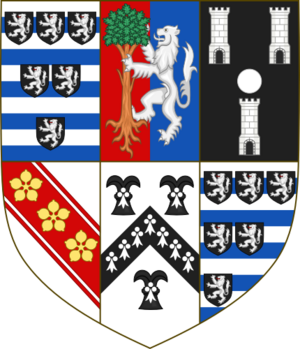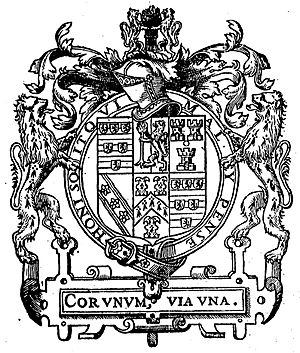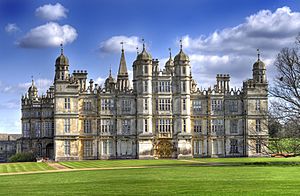William Cecil, 1st Baron Burghley facts for kids
Quick facts for kids
The Lord Burghley
|
|
|---|---|
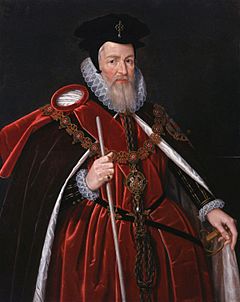
Portrait attributed to Marcus Gheeraerts the Younger
|
|
| Lord High Treasurer | |
| In office July 1572 – 4 August 1598 |
|
| Monarch | Elizabeth I |
| Preceded by | The Marquess of Winchester |
| Succeeded by | The Earl of Dorset |
| Lord Privy Seal | |
| In office 1590–1598 |
|
| Monarch | Elizabeth I |
| Preceded by | Sir Francis Walsingham |
| Succeeded by | Sir Robert Cecil |
| In office 1571–1572 |
|
| Monarch | Elizabeth I |
| Preceded by | Sir Nicholas Bacon |
| Succeeded by | The Lord Howard of Effingham |
| Secretary of State | |
| In office 22 November 1558 – 13 July 1572 |
|
| Monarch | Elizabeth I |
| Preceded by | John Boxall |
| Succeeded by | Thomas Smith |
| In office 5 September 1550 – 19 July 1553 |
|
| Monarch | Edward VI Jane |
| Preceded by | Nicholas Wotton |
| Succeeded by | John Cheke |
| Personal details | |
| Born |
William Cecil
13 September 1520 Bourne, Lincolnshire Kingdom of England |
| Died | 4 August 1598 (aged 77) Cecil House Westminster, London Kingdom of England |
| Resting place | St Martin's Church Stamford, Lincolnshire United Kingdom 52°38′56″N 0°28′39″W / 52.6490°N 0.4774°W |
| Spouses | Mary Cheke (d. 1543) |
| Children |
|
| Parents | Sir Richard Cecil Jane Heckington |
| Residences | Burghley House Cecil House Theobalds House |
| Education | St John's College, Cambridge |
| Signature |  |
William Cecil, 1st Baron Burghley (born September 13, 1520 – died August 4, 1598) was a very important English statesman. He was the main adviser to Queen Elizabeth I for most of her time as queen. He served twice as Secretary of State and later as Lord High Treasurer.
One historian said that for 40 years, Cecil's life was almost the same as Elizabeth's reign and the history of England. This shows how much influence he had.
Cecil wanted to create a united and Protestant British Isles. He worked to control Ireland and make an alliance with Scotland. He also believed England needed a strong navy to protect itself from attacks. He was not completely successful, but his ideas shaped England's future. In 1587, he convinced Queen Elizabeth to order the execution of Mary, Queen of Scots. Mary was involved in a plan to kill Elizabeth.
William Cecil was the father of Robert Cecil, 1st Earl of Salisbury. He started the Cecil family line, which includes many famous politicians. Two British prime ministers came from his family.
Contents
William Cecil's Early Life
Cecil was born in Bourne, Lincolnshire, in 1520. His father was Sir Richard Cecil, who owned the Burghley estate. His mother was Jane Heckington.
His family name, Cecil, comes from the Welsh word Seisyllt. His grandfather, David Cecil, moved to Stamford. David Cecil was a trusted helper of King Henry VII. He was elected to Parliament several times.
William was the only son. He went to school in Grantham and then Stamford School. He later helped save and support Stamford School. In 1535, at age 14, he went to St John's College, Cambridge. There, he met important scholars like Roger Ascham and John Cheke. He learned a lot of Greek.
He fell in love with Mary Cheke, John Cheke's sister. In 1541, his father sent him to Gray's Inn to study law. This was to stop him from marrying Mary. But it didn't work. Four months later, Cecil married Mary Cheke. Their only child, Thomas, was born in 1542. Mary died in 1543.
In 1546, Cecil married Mildred Cooke. She was known as one of the most educated women in England. Her sister, Anne, was married to Sir Nicholas Bacon, who was the father of Sir Francis Bacon.
Starting His Career
William Cecil began his career working for the Duke of Somerset. The Duke was Lord Protector (a powerful ruler) during the early years of young King Edward VI's reign. Cecil went with Somerset on a military campaign in Scotland in 1547.
Cecil was elected to Parliament for Stamford in 1547. He worked as a private secretary for the Duke of Somerset. When Somerset lost power in 1549, Cecil was arrested and sent to the Tower of London.
However, Cecil soon gained the trust of John Dudley, who became the new powerful leader. After less than three months, Cecil was released from the Tower. In 1550, he became one of King Edward's two secretaries of state.
When King Edward VI was dying, Northumberland tried to change who would become queen. He wanted Lady Jane Grey to be queen instead of Henry VIII's daughters, Mary and Elizabeth. Cecil was forced to sign a document supporting this plan. He later said he only signed as a witness.
When Mary I became queen, Cecil quickly showed his loyalty to her. He went to Mass and met with important Catholic leaders. He was elected to Parliament for Lincolnshire in 1553 and 1555.
Working for Queen Elizabeth
Before Queen Mary died, Cecil was already working for Princess Elizabeth. When Elizabeth became queen, she immediately trusted Cecil. She made him her Secretary of State. He managed the country's money, led the Privy Council (the Queen's main group of advisers), and created a strong spy network. This network was led by Francis Walsingham. Because of these roles, Cecil became the most important minister during Elizabeth's reign.
Foreign Policy
Cecil's main goal was to make England, Scotland, and Ireland a united, Protestant area. He wanted to conquer Ireland and form an alliance with Scotland. He also believed England needed a very strong Royal Navy to protect itself. His ideas became very important for England's future.
Cecil was a Protestant, but he was also practical. He helped Protestants in other countries, like the French Huguenots and the Dutch. He gave them just enough help to keep them fighting. This kept danger away from England.
He was willing to make tough decisions, even when the Queen hesitated. For example, he pushed for the execution of Mary, Queen of Scots. Mary was seen as a threat because many Catholics wanted her to be queen instead of Elizabeth.
Historians believe that Cecil's ideas often won out in English politics. Some even say he was the de facto (actual) ruler of England during his time as Secretary.
Domestic Politics
Cecil played a big part in creating the Anglican Church in 1559. This settlement matched his own Protestant beliefs. He became more Protestant over time. He was stricter with Catholics than with Puritans.
Queen Elizabeth herself praised him, saying he could not be bribed and was always loyal to the country.
Economic Policy
Cecil wanted to make sure England's policies matched its financial abilities. He believed in keeping a stable society and fair prices. He also wanted England to be independent and self-sufficient. He thought that a strong economy and a powerful country went hand-in-hand. He worried about relying on food from other countries and wanted to make sure people had jobs.
In Parliament
William Cecil was a Member of Parliament for Lincolnshire and Northamptonshire. He was very active in the House of Commons until he became a peer (a lord).
In 1561, he received the important job of Master of the Court of Wards and Liveries. In this role, Cecil looked after the money and education of wealthy boys whose fathers had died. These included famous figures like Edward de Vere, 17th Earl of Oxford and Robert Devereux, 2nd Earl of Essex. He is known for improving this system, which was often corrupt.
In 1559, he became the Chancellor of Cambridge University. He also became Chancellor of the University of Dublin in 1592.
On February 25, 1571, Queen Elizabeth made him a lord, Baron Burghley. He continued to be Secretary of State even after becoming a lord. This showed how important the job had become. In 1572, Cecil strongly told the Queen that she needed to deal with Mary, Queen of Scots. He believed Mary was a danger because she was a rallying point for Catholics and for England's enemies like Spain. Finally, in 1587, Elizabeth had Mary executed.
Treasurer
In 1572, the Lord High Treasurer died. This important job was offered to another powerful noble, who turned it down and suggested Burghley instead. He said Burghley was more suitable because of his great "learning and knowledge." As the years passed, the new Lord Treasurer's influence over the Queen grew even stronger.
Burghley's Homes
Burghley House, near Stamford, was built for Cecil between 1555 and 1587. It was designed to look like parts of Richmond Palace. This house became the home of his family for generations. It is a great example of 16th-century Elizabethan architecture. It shows how important Cecil was and how much money his family made from the wool trade.
Cecil House was his home in London. Queen Elizabeth I even ate dinner there in 1561, before it was fully finished.
He also built a new Theobalds House in Cheshunt between 1564 and 1585. He wanted a grand house to show his high status and to host the Queen. The Queen visited Theobalds eight times between 1572 and 1596.
Death and Family
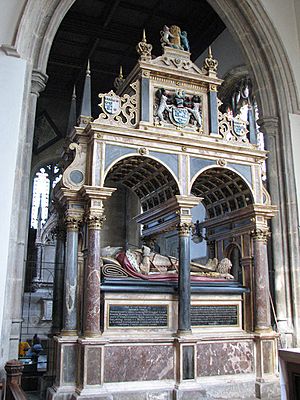
Burghley became ill in 1598. Before he died, his younger son, Robert, was ready to take over his role as the Queen's main adviser. William Cecil died at his London home, Cecil House, on August 4, 1598. He was buried in St Martin's Church, Stamford.
Descendants
William Cecil had children from his two marriages. With his first wife, Mary Cheke, he had:
- Sir Thomas Cecil (born 1542), who became the Earl of Exeter.
With his second wife, Mildred Cooke, he had:
- Frances Cecil (born around 1556)
- Anne Cecil (born 1556), who married Edward de Vere, 17th Earl of Oxford.
- Sir Robert Cecil (born 1563), who followed in his father's footsteps as a chief minister. He helped King James I of England take the throne smoothly. He became the Earl of Salisbury.
- Elizabeth Cecil (born 1564), who married William Wentworth.
Cecil's family line includes the Marquesses of Exeter and the Marquesses of Salisbury. One of his descendants, Robert Cecil, 3rd Marquess of Salisbury, served as Prime Minister three times in the late 1800s.
Private Life
William Cecil lived an honest private life. He was a loyal husband, a caring father, and a good master. He loved books and old things, especially heraldry (family symbols) and genealogy (family history). He was also a great builder and supporter of arts like architecture and gardening. His homes, Burghley House and Theobalds, were examples of this.
Cecil wrote 128 letters to his youngest son, Robert, throughout his life. These letters show how much he cared for his family. They also give advice on how to succeed in politics. These letters are a special record of his thoughts on family, illness, and his worries for the future of the Queen and England.
Images for kids
| Cecil Family Tree, including: Earls of Exeter and Salisbury (1605) and Marquesses of Exeter (1801) and Salisbury | |||||||||||||||||||||||||||||||||||||||||||||||||||||||||||||||||||||||||||||||||||||||||||||||||||||||||||||||||||||||||||||||||||||||||||||||||||||||||||||||||||||||||||||||||||||||||||||||||||||||||||||||||||||||||||||||||||||||||||||||||||||||||||||||||||||||||||||||||||||||||||||||||||||||||||||||||||||||||||||||||||||||||||||||||||||||||||||||||||||||||||||||||||||||||||||||||||||||||||||||||||||||||||||||||||||||||||||||||||||||||||||||||||||||||||||||||||||||||||||||||||||||||||||||||||||||||||||||||||||||||||||||||||||||||||||||||||||||||||||||||||||||||||||||||||||||||||||||||||||||||||||||||||||||||||||||||||||||||||||||||||||||||||||||||||||||||||||||||||||||||||||||||||||||||||||||||||||||||||||||||||||||||||||||||||||||||||||||||||||||||||||||||||||||||||||||||||||||||||||||||||||||||||||||||||||||||||||||||||||||||||||||||||||||||||||||||||||||||||||||||||||||||||||||||||||||||||||||||||||||||||||||||||||||||||||||||||||||||||||||||||||||||||||||||||||||||||||||||||||||
|---|---|---|---|---|---|---|---|---|---|---|---|---|---|---|---|---|---|---|---|---|---|---|---|---|---|---|---|---|---|---|---|---|---|---|---|---|---|---|---|---|---|---|---|---|---|---|---|---|---|---|---|---|---|---|---|---|---|---|---|---|---|---|---|---|---|---|---|---|---|---|---|---|---|---|---|---|---|---|---|---|---|---|---|---|---|---|---|---|---|---|---|---|---|---|---|---|---|---|---|---|---|---|---|---|---|---|---|---|---|---|---|---|---|---|---|---|---|---|---|---|---|---|---|---|---|---|---|---|---|---|---|---|---|---|---|---|---|---|---|---|---|---|---|---|---|---|---|---|---|---|---|---|---|---|---|---|---|---|---|---|---|---|---|---|---|---|---|---|---|---|---|---|---|---|---|---|---|---|---|---|---|---|---|---|---|---|---|---|---|---|---|---|---|---|---|---|---|---|---|---|---|---|---|---|---|---|---|---|---|---|---|---|---|---|---|---|---|---|---|---|---|---|---|---|---|---|---|---|---|---|---|---|---|---|---|---|---|---|---|---|---|---|---|---|---|---|---|---|---|---|---|---|---|---|---|---|---|---|---|---|---|---|---|---|---|---|---|---|---|---|---|---|---|---|---|---|---|---|---|---|---|---|---|---|---|---|---|---|---|---|---|---|---|---|---|---|---|---|---|---|---|---|---|---|---|---|---|---|---|---|---|---|---|---|---|---|---|---|---|---|---|---|---|---|---|---|---|---|---|---|---|---|---|---|---|---|---|---|---|---|---|---|---|---|---|---|---|---|---|---|---|---|---|---|---|---|---|---|---|---|---|---|---|---|---|---|---|---|---|---|---|---|---|---|---|---|---|---|---|---|---|---|---|---|---|---|---|---|---|---|---|---|---|---|---|---|---|---|---|---|---|---|---|---|---|---|---|---|---|---|---|---|---|---|---|---|---|---|---|---|---|---|---|---|---|---|---|---|---|---|---|---|---|---|---|---|---|---|---|---|---|---|---|---|---|---|---|---|---|---|---|---|---|---|---|---|---|---|---|---|---|---|---|---|---|---|---|---|---|---|---|---|---|---|---|---|---|---|---|---|---|---|---|---|---|---|---|---|---|---|---|---|---|---|---|---|---|---|---|---|---|---|---|---|---|---|---|---|---|---|---|---|---|---|---|---|---|---|---|---|---|---|---|---|---|---|---|---|---|---|---|---|---|---|---|---|---|---|---|---|---|---|---|---|---|---|---|---|---|---|---|---|---|---|---|---|---|---|---|---|---|---|---|---|---|---|---|---|---|---|---|---|---|---|---|---|---|---|---|---|---|---|---|---|---|---|---|---|---|---|---|---|---|---|---|---|---|---|---|---|---|---|---|---|---|---|---|---|---|---|---|---|---|---|---|---|---|---|---|---|---|---|---|---|---|---|---|---|---|---|---|---|---|---|---|---|---|---|---|---|---|---|---|---|---|---|---|---|---|---|---|---|---|---|---|---|---|---|---|---|---|---|---|---|---|---|---|---|---|---|---|---|---|---|---|---|---|---|---|---|---|---|---|---|---|---|---|---|---|---|---|---|---|---|---|---|---|---|---|---|---|---|---|---|---|---|---|---|---|---|---|---|---|---|---|---|---|---|---|---|---|---|---|---|---|---|---|---|---|---|---|---|---|---|---|---|---|---|---|---|---|---|---|---|---|---|---|---|---|---|---|---|---|---|---|---|---|---|---|---|---|---|---|---|---|---|---|---|---|---|---|---|---|---|---|---|---|---|---|---|---|---|---|---|---|---|---|---|---|---|---|---|---|---|---|---|---|---|---|---|---|---|---|---|---|---|---|---|---|---|---|---|---|---|---|---|---|---|---|---|---|---|---|---|---|---|---|---|---|---|---|---|---|---|---|---|---|---|---|---|---|---|---|---|---|---|---|---|---|---|---|---|---|---|---|---|---|---|---|---|---|---|---|---|---|---|---|---|---|---|---|---|---|---|---|---|---|---|---|---|---|---|---|---|---|---|---|---|---|---|---|---|---|---|---|---|---|---|---|---|---|---|---|---|---|---|---|---|---|---|---|---|---|---|---|---|---|---|---|---|---|---|---|---|---|---|---|---|---|---|---|---|---|---|---|---|---|---|---|---|---|---|---|---|---|---|---|---|---|---|---|---|---|---|---|---|---|---|---|---|---|---|---|---|---|---|---|---|---|---|---|---|---|---|---|---|---|---|---|---|---|---|---|---|---|---|---|---|---|---|---|---|---|---|---|---|---|---|---|
|
|||||||||||||||||||||||||||||||||||||||||||||||||||||||||||||||||||||||||||||||||||||||||||||||||||||||||||||||||||||||||||||||||||||||||||||||||||||||||||||||||||||||||||||||||||||||||||||||||||||||||||||||||||||||||||||||||||||||||||||||||||||||||||||||||||||||||||||||||||||||||||||||||||||||||||||||||||||||||||||||||||||||||||||||||||||||||||||||||||||||||||||||||||||||||||||||||||||||||||||||||||||||||||||||||||||||||||||||||||||||||||||||||||||||||||||||||||||||||||||||||||||||||||||||||||||||||||||||||||||||||||||||||||||||||||||||||||||||||||||||||||||||||||||||||||||||||||||||||||||||||||||||||||||||||||||||||||||||||||||||||||||||||||||||||||||||||||||||||||||||||||||||||||||||||||||||||||||||||||||||||||||||||||||||||||||||||||||||||||||||||||||||||||||||||||||||||||||||||||||||||||||||||||||||||||||||||||||||||||||||||||||||||||||||||||||||||||||||||||||||||||||||||||||||||||||||||||||||||||||||||||||||||||||||||||||||||||||||||||||||||||||||||||||||||||||||||||||||||||||||
See also
 In Spanish: William Cecil para niños
In Spanish: William Cecil para niños


